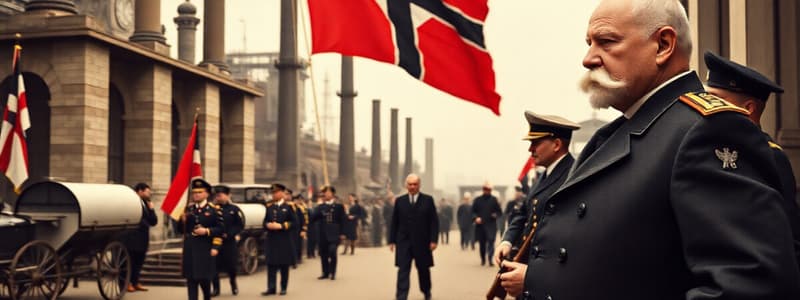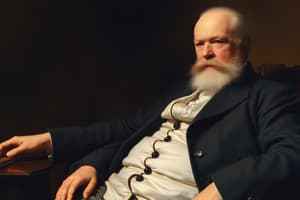Podcast
Questions and Answers
What was the main reason for appointing Prince Max von Baden as chancellor in October 1918?
What was the main reason for appointing Prince Max von Baden as chancellor in October 1918?
- To initiate military reforms
- To strengthen the German navy
- To facilitate armistice negotiations with the Allies (correct)
- To rally support for the kaiser
What action did the German admiralty take as the war was coming to an end?
What action did the German admiralty take as the war was coming to an end?
- Disband the kaiser's fleet
- Order a last major North Sea battle (correct)
- Cease U-boat operations
- Negotiate a peace treaty
Which event prompted Allied intervention to prevent a ceasefire between Prince von Baden and President Wilson?
Which event prompted Allied intervention to prevent a ceasefire between Prince von Baden and President Wilson?
- The unsatisfactory terms of negotiation
- The failed German naval engagements
- Wilson's refusal to negotiate with Germany
- The ongoing aggression of German U-boats (correct)
What did Admiral Reinhard Scheer describe the last major North Sea battle as?
What did Admiral Reinhard Scheer describe the last major North Sea battle as?
What was a key factor in the Allied refusal to accept any terms other than total surrender?
What was a key factor in the Allied refusal to accept any terms other than total surrender?
What impact did the Battle of Jutland have on German naval operations?
What impact did the Battle of Jutland have on German naval operations?
What was the primary motive for workers and sailors raising red flags during the rallies?
What was the primary motive for workers and sailors raising red flags during the rallies?
Who was the primary target for peace negotiations initiated by von Baden?
Who was the primary target for peace negotiations initiated by von Baden?
What was the primary goal of Germany's Schlieffen Plan at the onset of World War I?
What was the primary goal of Germany's Schlieffen Plan at the onset of World War I?
What led to the development of the Western Front during World War I?
What led to the development of the Western Front during World War I?
How did the Allies' blockade impact Germany during World War I?
How did the Allies' blockade impact Germany during World War I?
What was a consequence of adopting 'total war' by all major combatants by 1915?
What was a consequence of adopting 'total war' by all major combatants by 1915?
What was the effect of the Supreme Army Command's 'silent dictatorship' in Germany?
What was the effect of the Supreme Army Command's 'silent dictatorship' in Germany?
What condition of the German population by mid-1916 reflected the effects of total war?
What condition of the German population by mid-1916 reflected the effects of total war?
What unique action did the Allies take concerning food shipments to Germany in late 1914?
What unique action did the Allies take concerning food shipments to Germany in late 1914?
What role did agricultural labor play during the war in Germany?
What role did agricultural labor play during the war in Germany?
What characterized the political institutions of the German Empire by the 1890s?
What characterized the political institutions of the German Empire by the 1890s?
Which reforms did Bismarck introduce during the 1880s?
Which reforms did Bismarck introduce during the 1880s?
How did Bismarck’s government impact the German economy?
How did Bismarck’s government impact the German economy?
What significant change occurred with the ascension of Kaiser Wilhelm II in 1888?
What significant change occurred with the ascension of Kaiser Wilhelm II in 1888?
What was the political structure of imperial Germany most closely associated with?
What was the political structure of imperial Germany most closely associated with?
What was the aim of Bismarck's 'Realpolitik'?
What was the aim of Bismarck's 'Realpolitik'?
Which of the following statements best describes the social conditions in Germany during Bismarck's rule?
Which of the following statements best describes the social conditions in Germany during Bismarck's rule?
The transformation of the German Empire following Wilhelm II’s rise to power led to what major historical event?
The transformation of the German Empire following Wilhelm II’s rise to power led to what major historical event?
What significant action did the Bavarian king Ludwig III take on November 7th?
What significant action did the Bavarian king Ludwig III take on November 7th?
What was the main outcome of the Kiel mutiny?
What was the main outcome of the Kiel mutiny?
What political position did Friedrich Ebert hold in 1912?
What political position did Friedrich Ebert hold in 1912?
What was Ebert's view on violence as expressed in 1918?
What was Ebert's view on violence as expressed in 1918?
Which of the following did workers’ councils in German cities NOT demand?
Which of the following did workers’ councils in German cities NOT demand?
What was one of the criticisms Ebert faced during World War I?
What was one of the criticisms Ebert faced during World War I?
Which event directly led to the abdication of several German royals including the Kaiser?
Which event directly led to the abdication of several German royals including the Kaiser?
How did Ebert’s political views change over time?
How did Ebert’s political views change over time?
What was a significant obstacle to forming stable coalition governments in the Weimar Republic?
What was a significant obstacle to forming stable coalition governments in the Weimar Republic?
How did the Weimar government attempt to manage the issue of political representation?
How did the Weimar government attempt to manage the issue of political representation?
What was the effect of the Anti-Socialist Laws on the Social Democratic Party (SPD)?
What was the effect of the Anti-Socialist Laws on the Social Democratic Party (SPD)?
What characterized the nature of government in the Weimar Republic from 1924 onwards?
What characterized the nature of government in the Weimar Republic from 1924 onwards?
What was a significant challenge faced by Chancellors in the Weimar Republic?
What was a significant challenge faced by Chancellors in the Weimar Republic?
When was the Social Democratic Party (SPD) founded?
When was the Social Democratic Party (SPD) founded?
What was the initial stance of the SPD when it was formed?
What was the initial stance of the SPD when it was formed?
What was the outcome of the SPD's rapid growth in the late 19th century?
What was the outcome of the SPD's rapid growth in the late 19th century?
Flashcards are hidden until you start studying
Study Notes
Formation of the German Empire
- The German Empire was formed in 1871 after the unification of several German-speaking European kingdoms
- Imperial Germany was led by Germany’s most powerful state, Prussia, under the leadership of Otto von Bismarck, known for his pragmatic approach to politics
- The imperial government had limited democratic features, with most power held by conservative elites
- While authoritarian, the government was interested in the welfare of its people, establishing unemployment benefits, old age pensions, and protections for sick or injured workers
Early Years of the German Empire
- Under Bismarck’s leadership, Germany underwent rapid industrial and economic development, driven by heavy investment in factories, engineering, motors, chemical research, and electrification
- The government supported industrial growth by commissioning large-scale railway and infrastructure projects
- Both urban growth and standards of living increased significantly during this period
Kaiser Wilhelm II and Weltpolitik
- Emperor Wilhelm II, who became Kaiser in 1888, shifted Germany’s focus from domestic affairs to foreign policy
- Wilhelm II had expansionist ambitions, seeking to expand the German Empire abroad by increasing naval power and adopting a more forceful international approach
- He replaced Otto von Bismarck’s cautious “Realpolitik” with a more aggressive “Weltpolitik,” aimed at securing Germany's "place in the sun" on the world stage
World War I
- In 1914, Germany initiated the Schlieffen Plan, a strategy to invade France via neutral Belgium, to avoid facing fortifications along the French border
- The strategy initially succeeded but stalled, leading to the development of the Western Front, a trench network spanning 450 miles from the Swiss border to the North Sea
- In the east, Germany also successfully repelled a Russian advance into East Prussia, leading to the development of the Eastern Front
- By 1915, the war became “total war,” with all combatants, including Germany, mobilizing all resources and involving the civilian population
- Germany was subject to a naval blockade by the Allies, which halted trade, restricted food imports, and caused food shortages
Domestic Impact of World War I
- The war’s prolonged nature and impact on German society saw increased power of the Supreme Army Command, effectively sidelining the Emperor and Chancellor, while the Reichstag's influence dwindled
The End of World War I
- In October 1918, Kaiser Wilhelm II appointed Prince Max von Baden as Chancellor in an attempt to facilitate armistice negotiations with the Allies
- Germany’s continued naval aggression against Allied shipping and the Allies’ insistence on an unconditional surrender thwarted efforts to negotiate a ceasefire
- In November 1918, after the German Navy planned a final, desperate attack on the British and French coastlines, sailors in Kiel mutinied, sparking a revolution that spread throughout Germany
The Kiel Mutiny
- The Kiel mutiny, instigated by the sailors’ refusal to participate in a suicide mission, quickly grew, drawing in workers and spreading to naval bases and cities across Germany
- This led to the formation of political councils demanding republican and socialist reforms, culminating in the abdication of Kaiser Wilhelm II and other German royals
The Weimar Republic
- The Weimar Republic was established in Germany following the abdication of Kaiser Wilhelm II and the collapse of the German imperial government
- The Weimar government was marked by political instability and frequent changes in leadership due to the lack of a single party with a majority in the Reichstag
- Coalitions of several parties were formed to govern, creating difficulties in establishing consistent policies
- The Social Democratic Party (SPD) became the most influential party following the war, with Friedrich Ebert as its leader
- Ebert, the first president of the Weimar Republic, advocated for a peaceful transition to democracy and opposed violence as a means of political change.
The Social Democratic Party (SPD)
- The SPD was Germany’s oldest formally constituted political party, founded in 1875 as a Marxist organization
- In the 1877 elections, the SPD gained popularity, winning over 500,000 votes and 13 seats in the Reichstag
- The rapid growth and popularity of the SPD alarmed Chancellor Otto von Bismarck, who introduced the Anti-Socialist Laws in 1878, blaming the SPD for revolutionary and terrorist activities
- The SPD faced numerous restrictions and police crackdowns throughout the 1880s.
The Influence of Gustav Stresemann
- Stresemann’s leadership during the Weimar Republic saw a reduction in political violence.
- The government functioned better than in the early 1920s.
- Stresemann also introduced reforms in foreign policy and international relations.
- Despite these successes, the Weimar Republic lacked fundamental stability and cohesion within the Reichstag.
- The SPD's difficulty in creating lasting coalitions with other parties remained an obstacle to long-term stability.
Studying That Suits You
Use AI to generate personalized quizzes and flashcards to suit your learning preferences.




